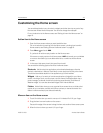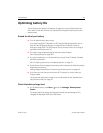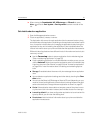
Android basics 49
AUG-2.3-103 Android User’s Guide
You manage how applications use storage memory directly and indirectly in many
ways as you use your phone, for example, by:
G Installing or uninstalling applications (see “Market” on page 341 and “Uninstall an
application” on page 52)
G Downloading files in Browser, Gmail, and other applications
G Creating files (for example, by taking pictures)
G Deleting downloaded files or files you created (see “Managing downloads” on
page 54 and the documentation for the applications you use)
G Using a computer to copy files to or delete files from your USB storage or SD card
(see “Connecting to a computer via USB” on page 67)
G Changing whether an application is installed in internal storage or in your phone’s
USB storage or SD card, if the application supports it (see “Change where an appli-
cation is stored” on page 52)
You rarely need to manage how applications use RAM: the operating system does this
for you. But you can monitor how applications use RAM and stop them if they
misbehave as described in “Stop a misbehaving application” on page 52.
Open the Manage applications screen
S Press Home , press Menu , and touch Manage apps.
OR
S Open the Settings application and touch Applications > Manage
applications.


















